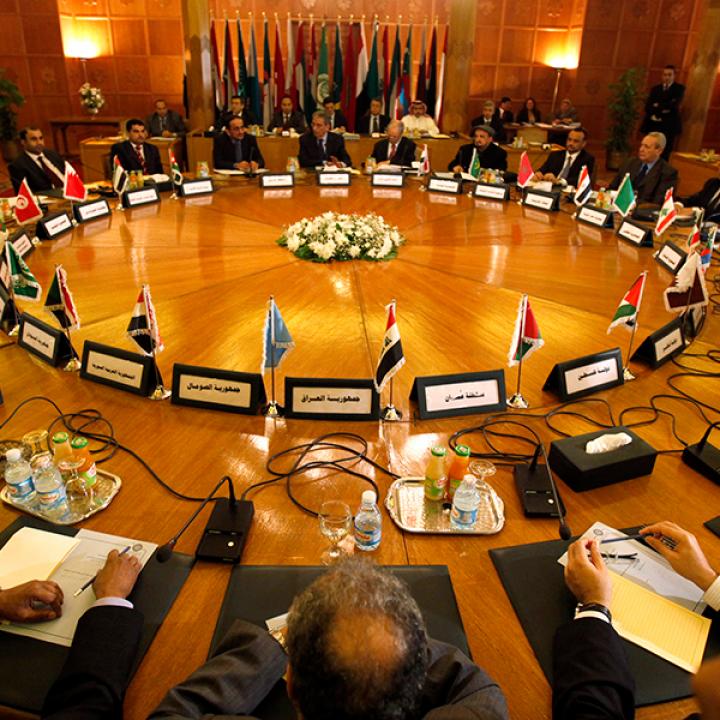
- Policy Analysis
- Policy Alert
The Dammam Summit: Testing the Limits of Arab-Israeli Engagement

Although the event's impact on bilateral Arab relations with Israel will likely be minimal, the issues addressed in its resolutions and the way they are framed will indicate how far leaders are willing to go in publicly engaging the state.
Recently, some Arab leaders have demonstrated a marked shift of tone in their informal statements about Israel, as when Saudi crown prince Muhammad bin Salman told the Atlantic earlier this month that "the Palestinians and the Israelis have the right to have their own land." Beyond covert security cooperation, however, this shift has not carried over into their actual policies or formal diplomatic rhetoric. The latest Arab League summit, scheduled for April 15 in the Saudi city of Dammam, will be an opportunity to see just how far the crown prince and other leaders are willing to go in this regard.
The Palestinian issue will not be high on the summit's agenda or most participants' list of priorities compared to more pressing matters such as Iran, Syria, Yemen, and Libya. Indeed, with a few exceptions—such as the 2002 Beirut summit, which adopted the groundbreaking Arab Peace Initiative—these gatherings tend to deal with the Palestinian issue in formulaic ways.
This weekend, however, Palestinian Authority president Mahmoud Abbas will likely attempt to shift the focus to his people—or, failing that, at least set the tone of Arab rhetoric toward Israel—by focusing on four issues:
- Securing a strong condemnation of Israel's response to the ongoing demonstrations in Gaza, as well as promises of concrete diplomatic action.
- Seeking a definitive, robust, and united Arab rejection of Washington's decision to recognize Jerusalem as Israel's capital.
- Locking Arab states into a collective rejection of any American peace plan that does not meet Palestinian interests.
- Preempting future progress on bilateral Arab-Israeli relations by pursuing formal reaffirmation of the approach laid out in the Arab Peace Initiative, which stipulated that such normalization cannot begin until Israel ends its occupation of Palestinian lands.
In doing so, Abbas will likely invoke Arab public opinion, which is still presumed to be strongly anti-Israel. He will also rely on officials and institutions that favor the traditional Arab approach to Israel—and there is no shortage of them. For example, Arab League secretary-general Ahmed Abul Gheit recently called on the International Criminal Court to probe the Gaza clashes, while Saudi foreign minister Adel al-Jubeir told participants at a March 22 Brookings Institution event in Washington, "We think that the fruits of peace have to come at the end, not in the beginning, because then where's the incentive?"
Whether Abbas proves persuasive or not, there will be no warm embrace of Israel this weekend, and the summit's final communique will inevitably criticize the state. Yet the document's handling of the four issues above will indicate whether the new tone heard from certain leaders in recent weeks has truly altered the Arab orthodoxy on peace diplomacy.
Of course, the summit's outcome will not be a definitive indicator of how individual leaders will approach bilateral relations with Israel going forward. Some of them may have concluded that the League's archaic, pan-Arabist gatherings are not the ideal forum for launching official departures from Arab orthodoxy. They may also calculate, correctly, that whatever the summit decides will have little or no impact on how their fellow member states actually conduct policy. And some may have concluded that further normalization with Israel—with its attendant political and diplomatic costs—is not urgent, especially since the ongoing covert security cooperation is addressing their most immediate needs.
Even so, the summit's outcome will shed light on the extent to which America's regional allies are willing to expend diplomatic and political capital to publicly advance a shift in peacemaking strategy. Some Arab leaders have reportedly indicated in private that they would support a new American approach to resolving the Israeli-Palestinian conflict. The dynamics displayed at the summit should inform Washington's calculus about how much these leaders can be counted on to publicly support its policies in the face of objections from the PA and the Arab establishment. While reversing long-held positions on the conflict may be a bridge too far given the host of more pressing issues at hand, the United States should at least encourage its Arab allies to reject any summit resolutions that would harden positions and limit the prospects of future diplomacy.
Ghaith al-Omari, a senior fellow at The Washington Institute, previously served in various advisory positions with the Palestinian Authority.



